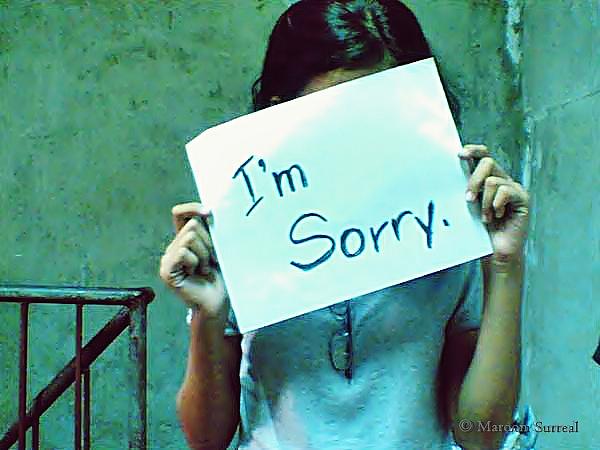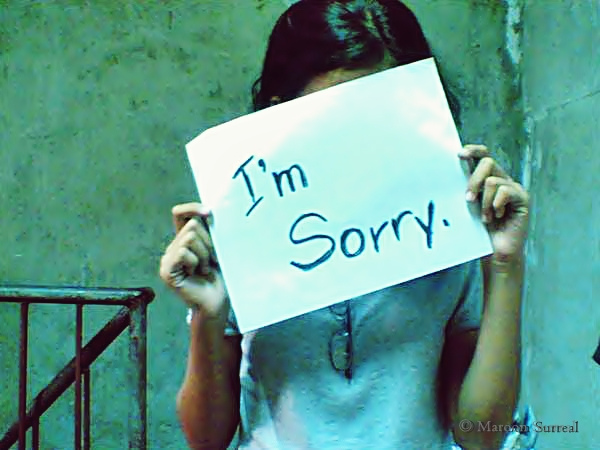Apology as Cure: Should Laws Change to Encourage Doctor to Admit Medical Errors?

 As anyone who has had a fight with a significant other knows, the best way to diffuse it is a sincere apology. A few tears with the apology can help, too.
As anyone who has had a fight with a significant other knows, the best way to diffuse it is a sincere apology. A few tears with the apology can help, too.
Saying sorry sends the message that you know you did something wrong and you want to work to repair the damage. If you got a ticket for running a red light or lost your temper with another parent at a soccer game, you need to show that you understand your error and that you are going to work to avoid repeating it.
With medical errors, the stakes are much higher than most spousal disputes, but the same principal can work. If physicians acknowledge their mistakes and apologize, patients may be less likely to sue.
An Illinois public relations consultant, Doug Wojcieszak, turned this concept into a program called Sorry Works! that he has been rolling out in states nationwide. He works with hospital organizations to train their staff in how to apologize. He lobbies state legislatures for changes to physician oversight that he says would encourage doctors to apologize, by making it harder for medical boards to discipline them and harder for people to sue them if they say sorry. Here's part of his proposal for medical board reform:
With state medical boards, clinicians who disclose and apologize and work with their hospital/insurance carrier to provide quick & fair compensation will not have disciplinary action taken against their licenses. To qualify for the "disclosure category," there must be a documented apology meeting between the patient/family and clinician(s), and the patient/family must indicate by signature that the meeting happened as part of the settlement and reporting process to the state licensure boards. Any attempts to forge this "apology document" will be met with stiff criminal penalties. This apology meeting may happen prior to litigation or any time during litigation (including during trial phase). However, only two claims involving apology can be reported to the state medical board in a ten-year time period. More than two claims during a ten-year time period will result in disciplinary action for all paid claims, including those previously shielded.
I have been inclined to like Sorry Works! just based on everything I had read about it and based on the fact that state Rep. Mary Flowers in Chicago had advocated for it. She's a long-time patient advocate who has fought steep odds to enact state-level reforms that help patients know more about their physicians' histories.
But then a group of patient advocates – led by Lisa McGiffert from Consumers Union's Safe Patient Project and Robert Oshel, the designer of the National Practitioner Data Bank's Public Use File – recently started a counter campaign against efforts by Sorry Works! to keep malpractice information out of the National Practitioner Data Bank. Their arguments against some of the reforms being pushed by Sorry Works! made me wonder about the limitations of an apology's power. They wrote:
The result of the ill-advised "Sorry Works!" proposal would be that the NPDB would disclose very few malpractice payments, but more importantly, hospitals, MCOs, and licensing boards could no longer rely on the NPDB to ensure that the information they received on physicians' applications for privileges or licensure is complete and accurate when it comes to malpractice payments. The greatly increased secrecy in physicians' malpractice history would lead to a lack of trust in the NPDB's reliability. The usefulness of the NPDB would be largely gutted. The extremely detrimental impact of the proposal would far outweigh any benefit from disclosure of malpractice solely to injured patients and their families.
The patient advocate group is full of reasonable people, many of whom will be familiar to Antidote readers, including Pat Mastors and Julia Hallisy. They present a constructive critique of the Sorry Works! plan. Both sides in this discussion seem to me to share quite a bit of common ground.
Hallisy and Mastors, for example, both have seen family members victimized by the health system, prompting both to push for new tools to empower patients. Wojcieszak, according to the biography on his website, "lost his oldest brother to medical errors in 1998." The bio says that, "his family successfully sued the hospital and doctors with the case settling in 2000."
The hospital attorneys - not the doctors - empathized with the Wojcieszak family, but only after the case was settled and money exchanged hands, and they never admitted fault or apologized for the incident." He has argued that medical malpractice settlements should not be kept secret, saying the common practice of confidentiality agreements are a "disaster for patient safety".
Both sides, too, have marshaled an array of facts and data to back up their arguments. In my next post, I'll suggest some ideas for investigations based on some of that data.
Related Posts:
Apology as Cure: Dig into Data to Find Number of Patients Harmed
Q&A with Mary Flowers: Looking for New Ways to Improve Patient Safety
Hospitals must change surgical scrub culture from within
Serious Complications: Should Andy Rooney's Cause of Death Be Kept Secret?
Q&A with Alan Bavley: Finding Gold in the National Practitioner Data Bank
Q&A with Journalist Alan Bavley: Keeping Track of Medical Malpractice Frequent Fliers
Photo credit: Maroon Surreal via Flickr

